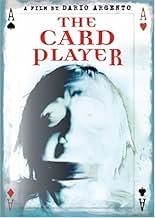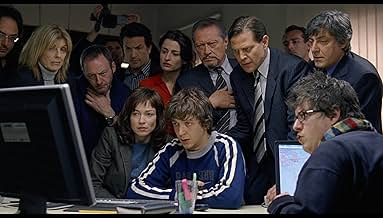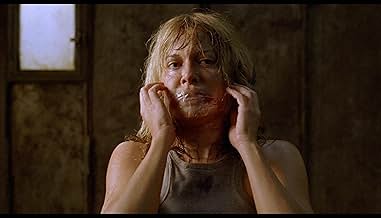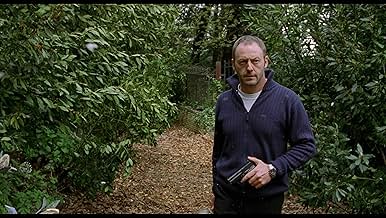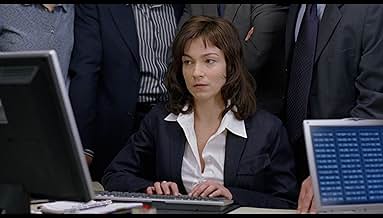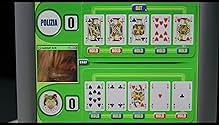VALUTAZIONE IMDb
4,9/10
5806
LA TUA VALUTAZIONE
Una poliziotta di Roma si allea con un agente dell'Interpol britannico per trovare un astuto serial killer che gioca al gatto e al topo con la polizia, rapendo e uccidendo giovani donne e mo... Leggi tuttoUna poliziotta di Roma si allea con un agente dell'Interpol britannico per trovare un astuto serial killer che gioca al gatto e al topo con la polizia, rapendo e uccidendo giovani donne e mostrando i suoi crimini su una webcam su Internet.Una poliziotta di Roma si allea con un agente dell'Interpol britannico per trovare un astuto serial killer che gioca al gatto e al topo con la polizia, rapendo e uccidendo giovani donne e mostrando i suoi crimini su una webcam su Internet.
- Regia
- Sceneggiatura
- Star
- Premi
- 1 candidatura in totale
Pier Maria Cecchini
- Flying Squad Chief
- (as Piermaria Cecchini)
Recensioni in evidenza
This movie deserves a bit more credit - it is not the best Argento film but it is certainly better than Phantom of the Opera. I think the main complaint that an Argento fan could have about this film is it is very un-Argento - it feels a bit more like a gory Ruth Rendell. However the plot is quite tight, the poker playing serial killer is a new concept that I quite appreciated, the main actress I thought was excellent, she reminded me a lot of Franka Potente. Definitely give this one a watch, its not the usual Argento style but it is still a good thriller. Do not watch this one if you are not a fan of Agatha Christie/Ruth Rendell/Inspector Morse and are expecting Argento's usual slightly bizarre edge - this is a pretty ordinary "detective trying to catch serial killer" flick.
The Card Player' directed and co-authored by leading Italian filmmaker, Dario Argento is quite different from what I expected, based on Argento'' reputation based on his best known film, the horror classic, 'Suspiria' of about 20 years ago. This movie is much less Wes Craven and much more Alfred Hitchcock, although I think Argento does not quite measure up to the Great Hitchcock in his use of subtlety and surprise, although there are a few good surprises in this film.
While this movie was made by a thoroughly Italian cast and crew, except for Irish actor, Liam Cunningham, almost all the original dialog as we hear it in the film was spoken in English as it was filmed. Mistaking this for a horror film was easy based on the cover art and some of the blurbs on the package. And, these hints are not entirely misleading, as there is a fair amount of intentional horror based on a fairly extended threat of death to a victim seemingly unable to free herself from the situation, unlike Hitchcock's secret threat, suddenly sprung on the unsuspecting victim as in 'Psycho'.
The mechanics and most business of the story are ultramodern. The victims are kidnapped, bound, and gagged (albeit a bit amateurishly), and the prep sends an e-mail to a female police detective that in order to free the Vic, the police will need to have someone play computer poker with the prep, freeing the Vic by winning two out of three hands. The first victim is a British tourist, bringing the Irish detective attached to the UK consulate in Rome into the case. And, this detective happens to be a forensics expert, so a lot of his early investigations are straight out of the 'CSI' casebook. Although, none are so modern that you couldn't see almost the identical business in a movie made 50 years ago, just as you see them in the murder / suicide investigation scene in Fellini's 'La Dolce Vita'.
Not only is the plot much more a thriller than a horror show, but the quality of the acting, directing, and camera work is high as well. Unfortunately, I feel the writing, in the implausibility of many plot turns, is just a bit too weak. While Argento may be one of the best known Italian filmmakers working today, his scripts fall far short of the great plot and dialog of Fellini and Bertolucci.
One of the very first weaknesses is in the way the police failed to play the contact with the prep. Given the chance to bring in an expert poker player to play the hands, that task falls wholly nilly to the female detective who is not only a poor poker player, but has a monkey on her back about gambling and poker, as her father committed suicide after a failure at cards. For the second kidnapping, the police happen upon a detective who knows something about poker, but who fails nonetheless. Only with the third victim do the police enlist the assistance of an expert computer poker player, who succeeds in effecting the release of the victim.
Explaining more implausibilities starts to give away some of the better parts of the plot, so I will stop there and note that this DVD has my very favorite feature, an audio commentary running the entire length of the film. The commentary is by the cinematic author, Alan Jones rather than by the director or his co-author or producer, but it's pretty good. Since, as the commentator notes, Argento does not film in any of the well-known tourist locations (except for a brief glimpse of the Pantheon and a scene in the Tiber), but in the 'real' bourgeois' Rome. So, commentator Jones gives us an orientation for where we are in Rome and on the events which help us understand the plot. He also points out the virtually total absence of blood in the film, which was a conscious decision by the director, since so many of his other films are so singularly bloody.
While this movie was made by a thoroughly Italian cast and crew, except for Irish actor, Liam Cunningham, almost all the original dialog as we hear it in the film was spoken in English as it was filmed. Mistaking this for a horror film was easy based on the cover art and some of the blurbs on the package. And, these hints are not entirely misleading, as there is a fair amount of intentional horror based on a fairly extended threat of death to a victim seemingly unable to free herself from the situation, unlike Hitchcock's secret threat, suddenly sprung on the unsuspecting victim as in 'Psycho'.
The mechanics and most business of the story are ultramodern. The victims are kidnapped, bound, and gagged (albeit a bit amateurishly), and the prep sends an e-mail to a female police detective that in order to free the Vic, the police will need to have someone play computer poker with the prep, freeing the Vic by winning two out of three hands. The first victim is a British tourist, bringing the Irish detective attached to the UK consulate in Rome into the case. And, this detective happens to be a forensics expert, so a lot of his early investigations are straight out of the 'CSI' casebook. Although, none are so modern that you couldn't see almost the identical business in a movie made 50 years ago, just as you see them in the murder / suicide investigation scene in Fellini's 'La Dolce Vita'.
Not only is the plot much more a thriller than a horror show, but the quality of the acting, directing, and camera work is high as well. Unfortunately, I feel the writing, in the implausibility of many plot turns, is just a bit too weak. While Argento may be one of the best known Italian filmmakers working today, his scripts fall far short of the great plot and dialog of Fellini and Bertolucci.
One of the very first weaknesses is in the way the police failed to play the contact with the prep. Given the chance to bring in an expert poker player to play the hands, that task falls wholly nilly to the female detective who is not only a poor poker player, but has a monkey on her back about gambling and poker, as her father committed suicide after a failure at cards. For the second kidnapping, the police happen upon a detective who knows something about poker, but who fails nonetheless. Only with the third victim do the police enlist the assistance of an expert computer poker player, who succeeds in effecting the release of the victim.
Explaining more implausibilities starts to give away some of the better parts of the plot, so I will stop there and note that this DVD has my very favorite feature, an audio commentary running the entire length of the film. The commentary is by the cinematic author, Alan Jones rather than by the director or his co-author or producer, but it's pretty good. Since, as the commentator notes, Argento does not film in any of the well-known tourist locations (except for a brief glimpse of the Pantheon and a scene in the Tiber), but in the 'real' bourgeois' Rome. So, commentator Jones gives us an orientation for where we are in Rome and on the events which help us understand the plot. He also points out the virtually total absence of blood in the film, which was a conscious decision by the director, since so many of his other films are so singularly bloody.
What can I say about this film? It certainly is not a typical Argento film (and I mean that in a very broad sense - there are some things you expect from an Argento film, like gore, tension and a certain visual style), but is it really bad? Well, it's not a terrible movie but from the man that gave us Suspiria, Deep Red and Tenebrae I expected much more.
First of all it's not giallo but more of a run of the mill detective story. Now, this wouldn't be bad if it was a good detective story, but it's not. The identity of the killer was predictable and some parts of the story did not make any sense. On top of that, the acting was not very good and the music was at best tolerable. And the final scene was just bad and did not make much sense.
The only good things about the movie were some great shots of Rome, and a couple of good, powerful scenes (like the first 2 murders) that reminded me a little of Argento's better films.
It's not a very bad movie, it's just a mediocre one. But since it's an Argento movie I expected much more. I give it 5 out of 10.
First of all it's not giallo but more of a run of the mill detective story. Now, this wouldn't be bad if it was a good detective story, but it's not. The identity of the killer was predictable and some parts of the story did not make any sense. On top of that, the acting was not very good and the music was at best tolerable. And the final scene was just bad and did not make much sense.
The only good things about the movie were some great shots of Rome, and a couple of good, powerful scenes (like the first 2 murders) that reminded me a little of Argento's better films.
It's not a very bad movie, it's just a mediocre one. But since it's an Argento movie I expected much more. I give it 5 out of 10.
After getting almost unanimously negative reviews, I was dreading watching IL CARTAIO. It turns out that the film is not bad at all. No, it's not another SUSPIRIA, but nor is it a PHANTOM OF THE OPERA, thankfully. People keep going on about the absence of Argento's trademark style. Well, I want to know what style that would be? Suspiria's? Phenomena's? The Stendhal Syndrome's? I think you get my point. Argento doesn't have one single style -- he had many, and I think that Il Cartaio's style is different rather than absent. I personally liked the camerawork and the cold look of the film. The use of shadow is really good, and I think this has got to be the only film Argento has done that is obviously set in the winter. It gave everything an eery look.
It's a tightly constructed little thriller with a lot of very tense set-piece scenes. The lack of gore confused me a bit, but everyone seems to forget the impalement of a certain character. That, to me, was pretty gory although admittedly not flamboyant. In many ways it seems a lot like the antithesis of Non Ho Sonno, which was extremely over the top in terms of violence.
I think Tenebre was the last film Argento did that received almost unanimous critical acclaim on its initial release. All of his other triumphs since then have grown on people over the years. I don't think Il Cartaio will be any different.
It's a tightly constructed little thriller with a lot of very tense set-piece scenes. The lack of gore confused me a bit, but everyone seems to forget the impalement of a certain character. That, to me, was pretty gory although admittedly not flamboyant. In many ways it seems a lot like the antithesis of Non Ho Sonno, which was extremely over the top in terms of violence.
I think Tenebre was the last film Argento did that received almost unanimous critical acclaim on its initial release. All of his other triumphs since then have grown on people over the years. I don't think Il Cartaio will be any different.
I have read the reviews complaining about that Dario has abandoned his style and all the gore to produce a tame TV-thriller. Far from the truth, according to me! I really think that this is the best he has done since "Opera". Granted, his stylish touch might seem to be muted compared to the baroque thriller of the 70s and 80s, but this cold and bleak atmosphere that he conjures up this time along with very brightly lit camera-work for most of the scenes, is something I enjoyed throughout! Sure, the gore is almost totally absent (apart from one scene), but as a whole this picture is much more efficiently done. The pace is fluent and unlike most of his other movies, there is actually no point where the characters just stand around and talk (and sometimes his players have been involved in some truly atrocious conversation) to fill out the time.
*MINOR SPOILER* And in "Il cartaio" the three main actors are actually very good! They are people you can care about and when they are in danger or die, you feel sorry for them. *END OF SPOILER* Like I mentioned before, I enjoyed the bleak look of the movie...as always classy camera-work in every frame of an Argento picture! And Claudio Simonetti's score is his best in years even though you might be just a little bit tired of it by the time the movie reaches it's conclusion. And talking about the finale, I found it both interesting, but at the same time also maybe a little bit of a letdown. However, the endings have been a bit weak lately in Dario's films. Not since "Tenebrae" has there been a really powerful conclusion. And two minor complaints finally...it was too easy to guess who the killer was. This has been mentioned before and I think it is true. The killer's identity could have been better camouflaged without a "certain scene" (you will know which one). And the card scenes went on too long on two occasions. The constant screaming from the victims became annoying in these scenes and I almost wanted them to die just to make them shut up! Otherwise, his best work in years and a film where he is not just content with repeating an old formula (like in "Sleepless" which I liked anyhow), but is actually trying to find a whole new path in his art.
*MINOR SPOILER* And in "Il cartaio" the three main actors are actually very good! They are people you can care about and when they are in danger or die, you feel sorry for them. *END OF SPOILER* Like I mentioned before, I enjoyed the bleak look of the movie...as always classy camera-work in every frame of an Argento picture! And Claudio Simonetti's score is his best in years even though you might be just a little bit tired of it by the time the movie reaches it's conclusion. And talking about the finale, I found it both interesting, but at the same time also maybe a little bit of a letdown. However, the endings have been a bit weak lately in Dario's films. Not since "Tenebrae" has there been a really powerful conclusion. And two minor complaints finally...it was too easy to guess who the killer was. This has been mentioned before and I think it is true. The killer's identity could have been better camouflaged without a "certain scene" (you will know which one). And the card scenes went on too long on two occasions. The constant screaming from the victims became annoying in these scenes and I almost wanted them to die just to make them shut up! Otherwise, his best work in years and a film where he is not just content with repeating an old formula (like in "Sleepless" which I liked anyhow), but is actually trying to find a whole new path in his art.
Lo sapevi?
- QuizThe idea behind 'The Card Player' came in 1996 just after the release of 'The Stendhal Syndrome' and was intended to be a sequel to 'The Stendhal Syndrome' titled 'In The Dark' with Asia Argento returning to portray the character of Anna Manni, but director Dario Argento then decided to make 'Phantom of the Opera' instead and the idea was abandoned.
- BlooperBoom mic visible at the top when English detective comes and insulting begins.
- Citazioni
John Brennan: THIS IS FUCKING BOLLOCKS!
- ConnessioniReferenced in Ti piace Hitchcock? (2005)
I più visti
Accedi per valutare e creare un elenco di titoli salvati per ottenere consigli personalizzati
- How long is The Card Player?Powered by Alexa
Dettagli
Botteghino
- Budget
- 2.000.000 € (previsto)
- Lordo in tutto il mondo
- 3.368.452 USD
- Tempo di esecuzione1 ora 43 minuti
- Colore
- Mix di suoni
- Proporzioni
- 1.85 : 1
Contribuisci a questa pagina
Suggerisci una modifica o aggiungi i contenuti mancanti

Divario superiore
By what name was Il cartaio (2003) officially released in India in English?
Rispondi


